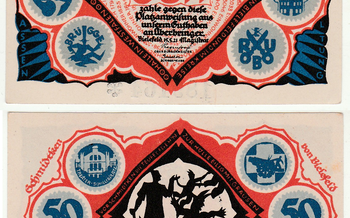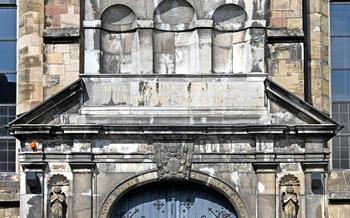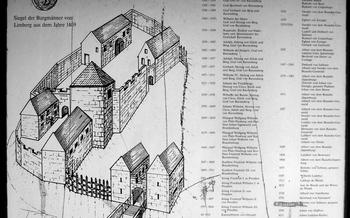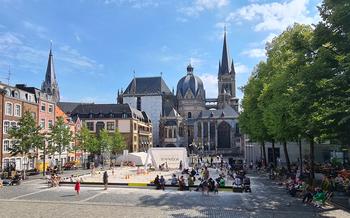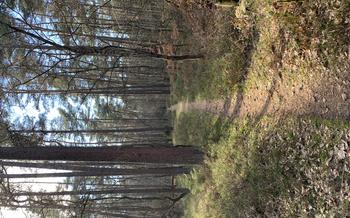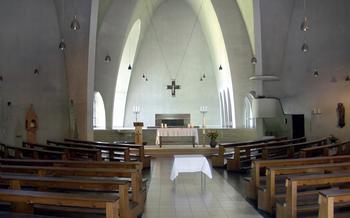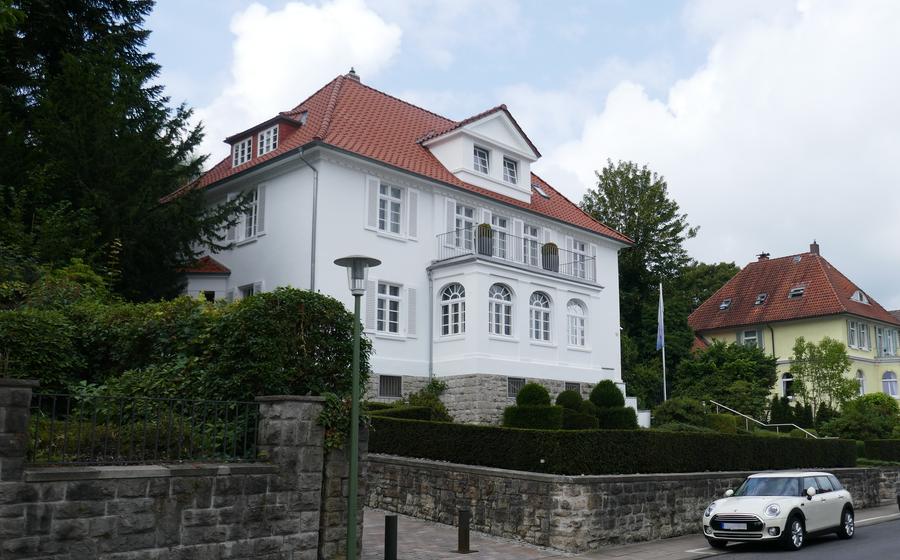
Mühlenkreis Minden Lübbecke (in the Minden Lübbecke district)
- Bielefeld and the Mühlenkreis Minden-Lübbecke
- Porta Westfalica
- Minden - A Journey Through History and Culture
- Lübbecke
- Rahden
- History:
- Nature:
- Culture:
- Activities:
- Espelkamp: A Blend of Industrial Heritage and Modern Charm
- Hille: Unveiling a Rich History and Natural Wonders
- History: Unearthing a Medieval Legacy
- Nature: Exploring the Idyllic Hille Marsch
- Culture: Engaging with Local Traditions and Festivals
- Activities: Embracing Outdoor Pursuits in Idyllic Surroundings
- Bad Oeynhausen: A Haven of Tranquility and Wellness
- Löhne
- Petershagen
- Stemwede
- Levern: A Journey Through History and Spirituality
- Marienmünster
- Insider Tip
Bielefeld and the Mühlenkreis Minden-Lübbecke
The Mühlenkreis Minden-Lübbecke, located in the heart of East Westphalia, is a region that captivates visitors with its rich history, stunning natural beauty, and diverse cultural heritage. Once home to ancient Germanic tribes, the region was later shaped by the influence of the Romans, Saxons, and Franks. Key events and landmarks that have played a significant role in the development of the district include the Battle of Minden in 1759, the founding of the city of Bielefeld in the 13th century, and the construction of the Mittelland Canal in the 19th century.
The Mühlenkreis Minden-Lübbecke boasts a unique geographical location, nestled between the Teutoburg Forest and the Weser River. This positioning has contributed to the region's diverse landscapes, which encompass rolling hills, lush forests, fertile plains, and picturesque river valleys. The district is renowned for its abundance of water, with numerous rivers, streams, and lakes dotting the landscape. These bodies of water provide a haven for wildlife and offer a variety of recreational opportunities for visitors.
The Mühlenkreis Minden-Lübbecke is a region steeped in culture and tradition. The local dialect, known as Plattdeutsch, is still spoken by many residents and adds a unique charm to the region. Traditional festivals and events, such as the Minden Midsummer Fair and the Rahden Schützenfest, celebrate the region's rich heritage and offer a glimpse into the local way of life.
The Mühlenkreis Minden-Lübbecke is a culinary paradise, offering a diverse range of regional specialties that reflect the region's agricultural roots. Visitors can indulge in hearty dishes such as Westphalian ham, Minden meatballs, and potato pancakes, as well as savor the region's renowned fruit brandies and beers.
Porta Westfalica
The Porta Westfalica is a striking gorge located in the Mühlenkreis Minden-Lübbecke district, where the Weser River cuts through the Wiehengebirge mountain range. This natural wonder has played a pivotal role in German history, serving as a strategic passageway between northern and southern Germany. In ancient times, the Romans recognized its importance and built a fort, known as the Porta Westfalica, to control access to the gorge.
The gorge is renowned for its captivating geology. The towering cliffs, formed from layers of sandstone and limestone, exhibit fascinating rock formations, caves, and fossils. Visitors can embark on a journey through time, exploring the geological wonders of the Porta Westfalica and unraveling the secrets of its ancient past.
The Porta Westfalica region boasts a mesmerizing natural landscape. The gorge is enveloped by lush forests, teeming with diverse flora and fauna. The Weser River, a vital waterway, meanders through the gorge, creating a serene and picturesque setting. Visitors can immerse themselves in the tranquility of nature, embarking on hiking or biking trails that wind through the forests and along the riverbanks, offering breathtaking views and opportunities for wildlife spotting.
Minden - A Journey Through History and Culture
Minden, a captivating city nestled along the Weser River, boasts a rich tapestry of history, architecture, and culture. As a former Hanseatic city, Minden played a significant role in trade and commerce, leaving an indelible mark on its urban fabric.
History: Minden's history dates back to the 8th century when it was founded by Charlemagne. Throughout the centuries, the city faced numerous challenges, including wars, fires, and sieges. Despite these adversities, Minden persevered and emerged as a thriving center of trade and culture.
Architecture: Minden's architectural heritage is a testament to its diverse past. The city's skyline is dominated by the imposing Minden Cathedral, a magnificent example of Gothic architecture. Other notable landmarks include the Minden City Hall, with its intricate Renaissance-style facade, and the picturesque Old Town, where charming half-timbered houses line the cobblestone streets.
Culture: Minden's vibrant cultural scene offers a wide range of experiences for visitors. The city is home to several museums, including the Minden Museum, which showcases the region's history and culture. The Stadttheater Minden presents a diverse program of plays, concerts, and dance performances. Minden is also renowned for its lively festivals, such as the Minden Midsummer Festival, which attracts visitors from near and far.
Shopping: Minden offers a unique shopping experience, blending traditional charm with modern convenience. The city center boasts a variety of boutiques, specialty shops, and traditional markets. Visitors can find everything from handmade crafts and local delicacies to the latest fashion trends.
Lübbecke
History: Lübbecke's intriguing legacy dates back to the Middle Ages, with its roots as a fortified settlement on the old Hellweg trade route. Over the centuries, it has witnessed significant events, including the Thirty Years' War and the Industrial Revolution, which have shaped its character and rich heritage.
Architecture: Lübbecke boasts an array of historical buildings that showcase its architectural heritage. The Rathaus, a striking Renaissance-style building, stands as a testament to the town's prosperous past. The St. Andreas Church, with its Gothic spires and intricate stained glass windows, is another architectural gem not to be missed.
Parks: Lübbecke is home to several serene green spaces that offer respite and recreation. The Kurpark, with its manicured gardens, tranquil ponds, and a charming café, is a popular spot for relaxation. The Bürgerpark, on the other hand, is a larger park with expansive lawns, playgrounds, and a miniature golf course, making it a great destination for families.
Activities: Lübbecke's picturesque streets are a delight to explore, with charming shops, cafés, and hidden gems waiting to be discovered. Take a leisurely stroll through the town center, admiring the historic facades and vibrant street art. Don't miss the opportunity to visit the local Heimatmuseum, which houses a collection of artifacts and exhibits that provide insights into Lübbecke's rich history and culture.
Rahden
History:
Unravel the captivating history of Rahden, a town steeped in the annals of time. Embark on a journey that traces its roots back to the 12th century, when it was first mentioned in historical records. Delve into the tumultuous events of the Thirty Years' War, which left an indelible mark on the town's landscape and psyche. Discover the stories of resilience, courage, and determination that shaped Rahden's destiny.
Nature:
Immerse yourself in the breathtaking natural beauty that surrounds Rahden. Explore the stunning Rahden Moor, a protected natural area that boasts a rich tapestry of flora and fauna. Marvel at the diverse plant life, including rare orchids and carnivorous sundews. Spot migratory birds that grace the skies above, and encounter the elusive European otter frolicking in the wetlands.
Culture:
Dive into the vibrant cultural heritage of Rahden, where traditions and festivities abound. Experience the infectious energy of the annual Rahdener Schützenfest, a colorful celebration that draws visitors from near and far. Immerse yourself in the local customs, indulge in traditional culinary delights, and engage with the friendly locals who are proud to share their rich cultural legacy.
Activities:
Indulge in a myriad of outdoor activities that Rahden has to offer. Embark on invigorating cycling trails that wind through picturesque landscapes, taking in the serene beauty of the countryside. Lace up your hiking boots and explore the intricate network of trails that crisscross the region, leading you to hidden gems and breathtaking viewpoints. For birdwatching enthusiasts, Rahden is a haven, with its diverse avian population that will thrill and delight.
Espelkamp: A Blend of Industrial Heritage and Modern Charm
Espelkamp is a city in the Minden-Lübbecke district, known for its rich industrial heritage and transformation into a modern, sustainable city. Discover the fascinating history of Espelkamp, from its humble beginnings as a farming village to its rise as a major industrial center in the 19th century. Explore the legacy of the textile industry, which played a pivotal role in the city's development, and learn about the challenges and triumphs that shaped Espelkamp's identity.
Immerse yourself in the city's innovative architecture, a blend of historical charm and contemporary design. Admire the Futurium building, a striking example of sustainable architecture, and explore the modern neighborhoods that showcase cutting-edge urban planning. Espelkamp is committed to sustainability, with initiatives such as green energy production, efficient waste management, and the preservation of natural habitats.
Experience the vibrant cultural scene of Espelkamp, with a diverse range of events, exhibitions, and performances throughout the year. From music festivals to art shows, there's always something to engage and entertain visitors. Don't miss the Espelkamp Museum, which houses a collection of artifacts and exhibits that tell the story of the city's past and present.
For outdoor enthusiasts, Espelkamp offers a variety of recreational activities at the Große Aue lake. Enjoy water sports such as sailing, windsurfing, and rowing, or relax on the sandy beaches and soak up the sun. Cycle or hike along the scenic trails that surround the lake, taking in the tranquil beauty of the natural landscapes.
Indulge in the local cuisine of Espelkamp, which combines traditional German dishes with international flavors. Sample the regional specialties, such as the hearty Westphalian ham, or savor the fresh catch of the day from the nearby lakes and rivers. Espelkamp's culinary scene offers a delightful blend of flavors and textures, sure to satisfy every palate.
Hille: Unveiling a Rich History and Natural Wonders
History: Unearthing a Medieval Legacy
Hille, a town steeped in historical significance, boasts a rich past that dates back to the Middle Ages. Its close ties to the Minden Cathedral, a prominent religious center in the region, have played a pivotal role in shaping its history. The town's origins can be traced to the 9th century, with the first written records mentioning it in 103Over the centuries, Hille has witnessed numerous significant events, including the Thirty Years' War (1618-1648), which left an enduring impact on the town and its surroundings.
Nature: Exploring the Idyllic Hille Marsch
Hille is not only known for its historical heritage but also for its stunning natural landscapes. The Hille Marsch, a unique wetland area, is a haven for nature enthusiasts and outdoor adventurers. This picturesque marshland, with its diverse flora and fauna, offers a tranquil retreat from the hustle and bustle of urban life. Visitors can explore the marshland on foot, following well-marked trails that lead through its serene landscapes. Birdwatching is a popular activity in the Hille Marsch, as the area is home to a wide variety of bird species, including migratory birds that stop over during their seasonal journeys.
Culture: Engaging with Local Traditions and Festivals
Hille's vibrant cultural scene reflects its rich history and deep-rooted traditions. The town hosts a variety of traditional events and festivals throughout the year, offering visitors a chance to immerse themselves in the local way of life. One of the most notable events is the Hille Schützenfest, an annual marksmen's festival that draws participants and visitors from across the region. The festival features a colorful parade, traditional music performances, and lively competitions, showcasing the town's camaraderie and festive spirit.
Activities: Embracing Outdoor Pursuits in Idyllic Surroundings
Hille offers a range of outdoor activities for visitors seeking adventure and recreation. The town's idyllic surroundings provide ample opportunities for hiking, biking, and cycling. Well-maintained trails wind through the scenic landscapes, allowing visitors to explore the region's natural beauty at their own pace. Fishing enthusiasts can cast their lines in the Hille Marsch, where they may encounter a variety of fish species. The town's proximity to the Weser River also makes it a popular destination for water sports enthusiasts, who can enjoy activities such as canoeing and kayaking along the river's tranquil waters.
Bad Oeynhausen: A Haven of Tranquility and Wellness
History:
Bad Oeynhausen, nestled in the picturesque Ravensberger Hügelland, boasts a rich history deeply intertwined with its reputation as a renowned health resort. The town's thermal springs, discovered in the 18th century, quickly gained fame for their healing properties, attracting visitors from all corners of Europe. This influx of health-seekers led to the development of Bad Oeynhausen as a spa town, with grand hotels, elegant promenades, and world-class medical facilities emerging to cater to their needs.
Architecture:
Bad Oeynhausen's architectural landscape reflects its transformation into a premier spa destination. The town center is adorned with stately buildings from the Wilhelmine era, characterized by their intricate facades and opulent ornamentation. The Kurpark, a sprawling park at the heart of the town, showcases beautifully manicured gardens, tranquil ponds, and impressive fountains, creating a serene oasis for relaxation and rejuvenation. The Wandelhalle, an iconic glass-domed structure, serves as a central gathering place for spa guests and visitors, offering a glimpse into the town's elegant past.
Culture:
Bad Oeynhausen's vibrant cultural scene complements its reputation as a health resort. The town hosts numerous events and festivals throughout the year, including the Bad Oeynhausener Theatertage, a renowned theater festival showcasing a diverse range of performances. The German Museum of Swimming is a must-visit for those interested in the history and evolution of this popular sport, while the Städtisches Museum offers a glimpse into the town's rich past.
Activities:
Relaxation and rejuvenation are at the core of the Bad Oeynhausen experience. Visitors can indulge in the thermal waters at the town's renowned spas, including the Bali Therme and the Aqua Magica, renowned for their therapeutic properties and luxurious amenities. The town's beautiful surroundings also beckon nature enthusiasts, with scenic walking and cycling trails winding through forests, meadows, and along the Werre River.
Löhne
Löhne is a town in the district of Herford, in North Rhine-Westphalia, Germany. It is located on the Werre River, about 15 km (9 mi) southwest of Bielefeld. Löhne has a population of around 40,000 people.
The town was first mentioned in a document in 103In the Middle Ages, Löhne was a small farming village. In the 19th century, the town experienced a period of rapid growth due to the development of the textile industry. Löhne became a major center for the production of linen and cotton goods.
Today, Löhne is a modern town with a diverse economy. The town is home to a number of large industrial companies, including the textile manufacturer Gütermann and the food processing company Dr. Oetker. Löhne is also a popular tourist destination, thanks to its well-preserved historical center and its beautiful surroundings.
History: Löhne's history dates back to the Middle Ages when it was a small farming village. In the 19th century, the town experienced a period of rapid growth due to the development of the textile industry. Löhne became a major center for the production of linen and cotton goods.
Architecture: Löhne's architecture reflects its rich history. The town center is home to a number of well-preserved historical buildings, including the Altes Rathaus (Old Town Hall) and the St. Michaelis Church. Löhne is also home to a number of modern landmarks, such as the Löhne Tower and the Werre Park shopping center.
Culture: Löhne has a vibrant cultural scene. The town is home to a number of museums, theaters, and music venues. Löhne also hosts a number of annual festivals and events, including the Löhne Schützenfest and the Löhne Christmas Market.
Activities: There are a number of things to see and do in Löhne. Visitors can explore the town's historical center, visit the museums, or attend a concert or play. Löhne is also a great place to go for a walk or bike ride. The town is surrounded by beautiful countryside, and there are a number of hiking and biking trails in the area.
Petershagen
Petershagen, a charming town nestled along the Weser River, boasts a rich history that intertwines with the Hanseatic League and the Thirty Years' War. Explore the town's historic center, where remnants of the past blend seamlessly with modern life. Admire the impressive Petershagen Windmill, a symbol of the town's industrial heritage, and delve into the captivating exhibits at the Petershagen Museum, which narrates the town's journey through the ages.
Nature enthusiasts will find solace in the scenic landscapes that surround Petershagen. Embark on a leisurely stroll along the Weser River, marveling at the serene beauty of the water and the lush greenery that lines its banks. Discover the wonders of the Petershagen Marsch, a protected natural area teeming with diverse flora and fauna. Whether you prefer hiking, cycling, or birdwatching, the natural surroundings of Petershagen offer a sanctuary for outdoor enthusiasts.
Immerse yourself in the vibrant local culture of Petershagen, where traditions and customs are celebrated with fervor. Join the lively festivities of the Petershäger Schützenfest, an annual marksmen's festival that showcases the town's rich heritage. Experience the warmth and hospitality of the locals as they come together to celebrate their shared history and traditions.
Petershagen beckons travelers seeking tranquility and cultural immersion. Whether you're exploring the town's historic streets, venturing into the picturesque countryside, or connecting with the friendly locals, Petershagen promises an unforgettable journey that will leave you with cherished memories.
Stemwede
History:
Stemwede, a town immersed in rural charm, boasts a rich and unique cultural heritage. Its history is deeply intertwined with agriculture and rural traditions. Farmers in the region have long been renowned for their expertise in cultivating flax and producing high-quality linen. This legacy is proudly celebrated at the Stemweder Bauernmarkt, an annual event that showcases the town's agricultural heritage and offers a vibrant marketplace for local produce and handcrafted goods.
Nature:
Stemwede is a nature lover's paradise, offering a mesmerizing tapestry of idyllic landscapes. The Stemweder Berg, a prominent hill rising above the surrounding countryside, invites visitors to embark on invigorating hikes and cycling trails, rewarded by breathtaking panoramic views. In contrast, the Große Moor, an extensive nature reserve, offers a sanctuary for diverse flora and fauna. Explore its tranquil paths, discover hidden ponds, and marvel at the vibrant array of wildflowers that adorn the landscape.
Culture:
Stemwede's cultural identity is deeply rooted in its rural traditions and sense of community. The Stemweder Bauernmarkt, held annually, is a vibrant celebration of local agriculture and craftsmanship. Farmers, artisans, and food vendors gather to showcase their finest products, creating a lively atmosphere filled with the aromas and flavors of the region. Engage with the locals, learn about their way of life, and savor the authentic experiences that Stemwede has to offer.
Activities:
Stemwede offers a plethora of outdoor activities for visitors to immerse themselves in the beauty of the natural surroundings. Lace-up your hiking boots and embark on scenic trails that wind through forests, meadows, and along the banks of the Große Aue river. For a more leisurely experience, hop on a bicycle and cycle along dedicated paths, enjoying the fresh air and picturesque landscapes. Horseback riding enthusiasts can explore the countryside on guided tours, immersing themselves in the tranquility of the natural surroundings.
Levern: A Journey Through History and Spirituality
Steeped in history and religious significance, Levern beckons travelers with its captivating charm. The town's rich past unfolds through its architectural treasures, inviting visitors to delve into its spiritual heritage. At the heart of Levern lies the Levern Abbey, a magnificent testament to the town's Benedictine roots. Founded in the 9th century, the abbey's impressive architecture showcases intricate details and a serene ambiance. Guided tours provide insights into the abbey's fascinating history and its role as a spiritual center throughout the centuries.
Another architectural gem in Levern is the St. Marien Church, a striking symbol of Gothic grandeur. With its soaring spires and elaborate ornamentation, the church stands as a testament to the town's devotion and artistic prowess. Inside, visitors can admire the church's beautiful stained-glass windows, intricate frescoes, and awe-inspiring altarpieces, each narrating stories of faith and devotion.
Beyond its religious heritage, Levern offers a vibrant cultural scene, with traditional events and festivals that showcase the town's unique identity. The annual Levern Schützenfest is a highlight, attracting visitors from near and far. This lively festival features a colorful parade, traditional music, dancing, and a festive atmosphere that encapsulates the town's spirit.
For a more active experience, Levern offers a network of scenic hiking and biking trails that wind through the picturesque countryside. These trails provide a chance to immerse in nature's tranquility while discovering hidden gems and breathtaking viewpoints. A visit to the nearby Levern Castle adds a touch of adventure to your Levern journey. This 14th-century castle, perched atop a hill, offers stunning panoramic views of the surrounding landscape.
Levern's charm extends beyond its historical and natural attractions. The town's welcoming community and vibrant local scene create a warm and inviting atmosphere. Engage with the locals, savor the delicious regional cuisine, and immerse yourself in the town's rich traditions. Levern promises an unforgettable experience that blends history, spirituality, and natural beauty, leaving visitors with a lasting sense of wonder and inspiration.
Marienmünster
History: Marienmünster, a town steeped in history, owes its origins to a Benedictine monastery founded in the 8th century. Over the centuries, the monastery played a significant role in the region's religious and cultural development. Visitors can delve into this rich history by exploring the impressive Marienmünster Abbey, a testament to the town's monastic past.
Architecture: Marienmünster boasts a wealth of architectural treasures. The Marienmünster Abbey, with its striking Romanesque-Gothic style, stands as a magnificent example of medieval architecture. Equally impressive is the St. Vitus Church, a 12th-century edifice showcasing a harmonious blend of Romanesque and Gothic elements. These architectural gems offer a glimpse into the town's artistic and cultural heritage.
Culture: Marienmünster's vibrant cultural scene is deeply rooted in its history and traditions. The Marienmünster Schützenfest, an annual marksmen's festival, is a highlight of the town's cultural calendar, attracting visitors from near and far. This lively festival showcases traditional customs, music, and camaraderie, providing an immersive experience of the local culture.
Activities: Nestled amidst scenic landscapes, Marienmünster offers a range of outdoor activities for nature enthusiasts. Hiking and biking trails meander through picturesque surroundings, allowing visitors to explore the town's natural beauty. The nearby Externsteine rock formations, with their mystical aura and historical significance, are a must-visit for those seeking a unique and awe-inspiring experience.
Insider Tip
Hidden Gem: Embark on a journey to the idyllic village of Hüllhorst, nestled amidst rolling hills and lush forests. Discover the hidden gem of the Hüllhorst Mill, a beautifully preserved watermill that has been lovingly restored to its former glory. Step back in time as you explore the mill's historic machinery and learn about the traditional milling process. Immerse yourself in the tranquil atmosphere, surrounded by the gentle sounds of the flowing water and the scent of freshly ground flour.
Local Delicacy: Tantalize your taste buds with the regional delicacy of "Pumpernickel," a traditional dark rye bread that is a culinary symbol of the Minden-Lübbecke district. Savor the rich, slightly sour flavor and dense texture of this hearty bread, which has been a staple in the region for centuries. Indulge in a slice of Pumpernickel topped with fresh butter and a dollop of homemade jam, and experience the true taste of Westphalia.
Photography Spot: Capture the essence of the Mühlenkreis Minden-Lübbecke district with a visit to the Wittekindsburg, an ancient hilltop fort that offers breathtaking panoramic views of the surrounding countryside. Ascend the hill and immerse yourself in the historical significance of this site, which played a pivotal role in the Saxon Wars of the 8th century. Let your lens capture the sweeping vistas, rolling hills, and picturesque villages that dot the landscape, creating a postcard-perfect scene.
Sustainable Travel: Embrace sustainable travel practices by exploring the region on two wheels. Discover the extensive network of well-maintained cycling paths that crisscross the Mühlenkreis Minden-Lübbecke district, providing a scenic and eco-friendly way to traverse the countryside. Immerse yourself in the natural beauty of the region as you pedal through lush forests, charming villages, and along the banks of tranquil rivers. Experience the joy of sustainable travel as you leave a minimal environmental footprint while creating lasting memories.
